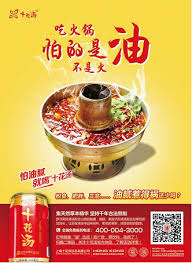The battle is essentially over the concepts of internal heat and oily/greasy food, whichever resonates with consumers the strongest. Whenever you have the symptoms of sore throat, ulcer, lack of sleep, acne and constipation, you know you have internal heat. You get internal heat not just from eating hot pot but from eating fried and spicy food, not drinking enough water and stress. Internal heat is also common during winter due to the excessive consumption of hot pot and not sweating enough. Therefore, internal heat is universal and presents a big market for herbal tea drinks to help consumers cool down their internal body system.
 |
| Internal heat |
The fat-addressing appeal is only limited to the eating occasion. You will only think of drinking Shihuatang when you are eating oily and greasy food such as hot pot with the intention of diluting the fat. Shihuatang will only work if it is able to convince consumers the drink can help dilute the fat in oily and greasy food. Therefore, the market for Shihuatang is smaller than the herbal tea drinks represented by Wang Lao Ji/Jia Duo Bao as Shihuatang is not a drink for all occasions.
In China, consumers turn to detox tea and slimming tea to slim down. Such marketing materials usually show a woman with a very slim contour such as in the example of Besunyen slimming tea. Despite the popularity of packet slimming tea and detox tea, ready-to-drink (RTD) slimming tea hasn’t really taken off in China unlike in Taiwan with the success of the “oil cutting” (油切) concept there. In China, Taiwan’s Heysong Oil Cutting Barley Tea (黑松油切麦茶) with its contour-shaped bottle has not been successful due to the choice of the barley taste. Barley is not the most popular RTD tea flavour in the country, something Heysong needs to address.
Japan’s Suntory has also tried associating its oolong tea in China as the perfect companion for oily and greasy food. According to the company, the oolong tea helps to dilute the oil in the food. Consumers can enjoy all their favourite food without having to fear of gaining the extra fat.
Is oolong tea a good fit for pizza and other oily and greasy food? I don’t think. For Shihuatang, it has the added advantage in taste. Shihuatang is a sweetened herbal tea and it builds on consumer acceptance of Wang Lao Ji/Jia Duo Bao as the drink for hot pot. Rather than focusing on internal heat, Shihuatang addresses consumer concern, both male and female, about getting fat from consuming fatty food. Such a new health positioning ensures a ready market for Shihuatang but the key challenge is to convince hot pot chains to carry Shihuatang. Wang Lao Ji/Jia Duo Bao, which have worked so hard to make their products available in the hot pot channel, will definitely not make the task easy for Shihuatang.

















